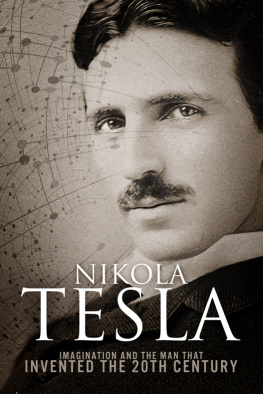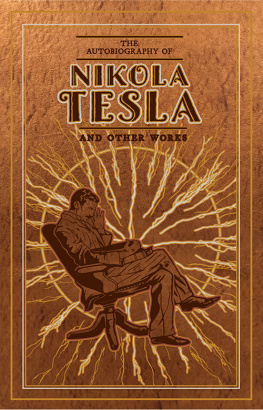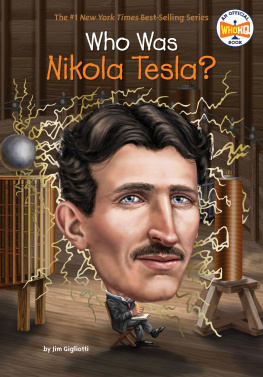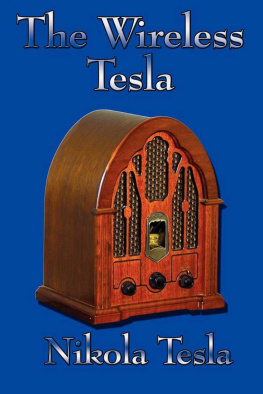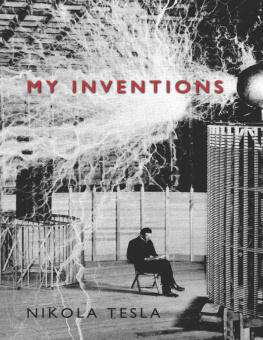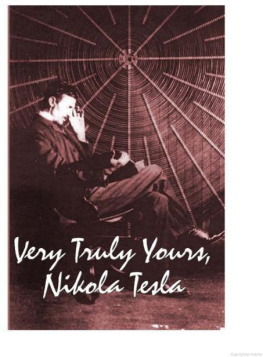Nikola Tesla
Imagination and the Man That Invented the 20th Century
Copyright 2013 by Sean Patrick
All rights reserved. No part of this book may be reproduced in any form or by an electronic or mechanical means, including information storage and retrieval systems, without permission in writing from the publisher, except by a reviewer who may quote brief passages in a review.
Written by Sean Patrick
First Edition
The Great Mystery of Genius
Thousands of geniuses live and die undiscoveredeither by themselves or by others.
-Mark Twain
If I could write one sentence that would magically increase your IQ by thirty points, would you be interested in reading that sentence?
Probably. But why? What would be in it for you? Do you think it would help you make more money? Make a name for yourself? Find love, happiness, or fulfillment?
Ive asked many people these questions and their answers are invariable. Of course it would. The cultural correlation is undeniable: weve been indoctrinated to believe that the higher the IQ, the more likely one is to succeed in life. Hence, we assume that the scientists that win Nobel Prizes, the businesspeople that go from rags to millions, the authors that write runaway bestsellers, register in the highest ranges of IQ simply because theyre enjoying sweet successes.
Well, a tremendous amount of research has been done into the scientific correlation between IQ and real-life success, and a very different picture has emerged.
IQ and success are related...to a point. Sure, someone with an IQ of 150 (a genius by all normal standards) is going to do much better in life than someone with an IQ of 80 (nearly mentally disabled). Similarly, a person with an IQ of 130 (near genius) has a significant upper hand in life when compared to a person with an IQ of 100 (average).
But heres the catch: the relation between IQ and success follows the law of diminishing returns. That is, when you compare two people of relatively high IQs, you can no longer predict success by IQ alone. A scientist with an IQ of 130 is just as likely to rise to the top of his discipline as one with an IQ of 180.
Dr. Liam Hudson, a British psychologist that headed up Cambridges Research Unit of Intellectual Development in the sixties, compared IQ to basketball. If youre five foot five, your prospects of becoming even an NBA bench warmer are slim-to-none. The fact is if youre less than six feet tall, you can pretty much forget about your dreams to challenge King James in his court.
Statistical data shows us that you have to be at least seventy-two inches tall to be allowed on the ride, and each inch you push over that is probably better for you. There comes a point, however, when height just doesnt matter much anymore. Just because someone is seven feet tall doesnt mean hes a better player than someone whos six foot six (Michael Jordans height). The point is you only have to be tall enough to have a shot at the pros.
The same pattern is true of intelligence and success in life. You only have to be smart enough to fulfill the intellectual requirements for success. Historys greatest achieverspractical, savvy people that did big things and changed the worldare heralded as the greatest geniuses to ever have walked the earth, but while many of them had remarkably high IQs, many others were just smart enough.
If we cant explain their success in terms of IQ alone, what else did they possess that allowed them to rise to such heights?
Most people would answer along the lines of extraordinary inherent talent. And they would be wrong.
- -
Call in the inspired bard, Demodocus.
God has given the man the gift of song.
Thats one of the many god-given gifts of characters in the Odyssey. Weve learned much since it was writtenweve decoded human DNA and discovered our place in the universebut we still marvel at the abilities of geniuses in the same way as the ancient Greeks did.
Whether we listen to a sonata of Beethovens, watch highlight reels of Michael Jordan, or learn a law of Newtons, we view extraordinary human skills as gifts granted by unknown forces for unknown reasons. Such an explanation is convenient, but is it correct?
For the last two centuries, behavioral scientists have studied that question through focused research on great performers of all types: business managers, chess players, swimmers, surgeons, jet pilots, violinists, salespeople, writers, and many others. Their findings, numbering in the hundreds, have led to conclusions that fly straight in the teeth of what everybody knows about ability.
The studies conclusively disproved the notion that great performance stems primarily from a natural gift or talent. While some people display innate talents for certain activities early on, amazingly average people have become champions in all manner of endeavors. Many such top performers overcame their averageor even below-averageintellects and nonexistent aptitudes to develop outstanding abilities in disciplines such as chess, music, business, and medicine.
Examples of such remarkable transformations abound throughout history. Henry Ford failed in business several times and was flat broke five times before he founded the Ford Motor Company. In his youth, Thomas Edisons teachers told him he was too stupid to learn anything. Beethoven was so awkward on the violin that his teachers believed him hopeless as a composer.
The world of sports reveals similar findings. Many athletes viewed as superhuman in their abilities were found to have little or no inherent advantage over their peers when they first began their journeys to greatness. Michael Jordan didnt make his sophomore team because he was deemed too short and average to play at that level. Stan Smith, a world-class tennis player and winner of Wimbledon, the U.S. Open, and eight Davis cups, was once rejected for the lowly position of a ball boy because the event organizers felt he was too clumsy and uncoordinated.
How do we explain such unintuitive findings?
While many theories were put forth, there was one common factor that researchers recognized in all great performers: they practiced so hard and intensely that it hurt.
Ted Williams, a baseball legend considered the most gifted hitter of his time, was believed to have natural abilities far beyond ordinary men, including eagle-like vision, extraordinary hand-eye coordination, and uncanny hitting instincts. Williams later said that such stories were all a lot of bull. He had a much better explanation for his superior skills.
Williams began his path to greatness at the age of seven, when he decided to dedicate his entire life to one singular task: hitting a baseball as perfectly as possible. Starting at that young age, Williams spent every free minute he had at San Diegos old North Park field hitting balls, every day, year after year after year. His childhood friends recall finding him on that field smashing balls with the outer shells completely beaten off, with a splintered bat, and with blistered, bleeding hands. He would spend his lunch money to hire other kids to shag his balls so he could hit as many as possible every day. When the city turned off the fields lights, he would go home and swing a rolled-up newspaper in the mirror until he went to bed.
This obsession continued throughout Williams entire professional career, and its no surprise that he excelled because of it. For The Kid, as he was known, greatness was a long, grueling processnot a gift from the beyond (a claim that he found insulting).
Studies of people with extraordinary abilities, like Ted Williams, have given rise to what Swedish psychologist Dr. K Anders Ericsson called the 10,000 hour rule. The rules premise is that, regardless of whether one has an innate aptitude for an activity or not, mastery of it takes around ten thousand hours of focused, intentional practice. Analyzing the lives of geniuses in a wide range of intellectual, artistic, and athletic pursuits confirms this concept. From Mozart to Bobby Fischer to Bill Gates to the Beatles, their diverse journeys from nothing toward excellence in their respective fields shared a common denominator: the accumulation of ten thousand hours of unwavering exercise of their crafts.

